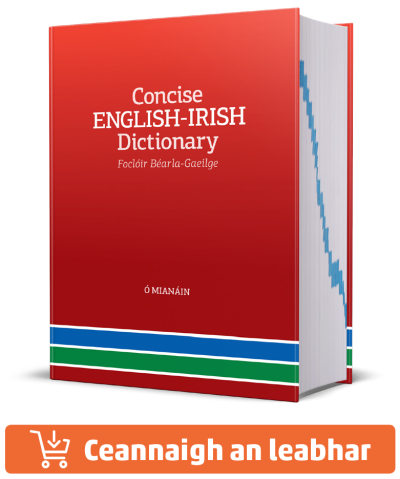Foclóir Gaeilge–Béarla
Ó Dónaill, 1977
An Foclóir Beag
Ó Dónaill & Ua Maoileoin, 1991
English–Irish Dictionary
de Bhaldraithe, 1959
Gramadach
Foghraíocht
oisté-eolaíocht
oistiam
oistín
oiteolaíocht
oitir
oitreach
oitriúil
ól
-ól
ola
ola-adhainte
olabhraon
olabhraonach
olach
ólach
ólachán
olacheantar
olachloch
olachrann
oladhath
ola-éadach
olaga(i)-
Olagaicéineach
ól1, m. (gs. as s. óil, as vn. ~ta). 1. vn. of ól2. 2. Drink. (a) Drinking-liquid. Is milis, glas, daor, an t-~ é, it is a sweet, weak, dear, drink. S.a. ithe 2(a). (b) (Indulgence in) intoxicating liquor. An t-~, drink, the habit of drinking. Bheith ar an ~, to be drinking, on the booze. Stad, ligean, den ~, to stop, abstain from, drinking. ~ a dhéanamh, to do a bout of drinking. Bhí ~ déanta acu, they had drink taken. ~ a chur ar dhuine, to force a drink on s.o. Braon óil, drop of drink. Teach (an) óil, public house. (c) Measure, portion, of drink. ~ a ghlaoch, to call for drink. Tá ~ féine ann, it is a huge drink.
ól2, v.t. & i. 1. Drink. (a) Deoch (uisce, bhainne, leanna) a ~, to take a drink (of water, of milk, of ale). ~ braon tae, take a drop of tea. D’~ sé gloine (bhiotáille), pionta (beorach), he drank a glass (of spirits), a pint (of beer). An ~ann tú? Do you take a drink? Tá sé ag ~, he is drinking, boozing. Ag ~ go trom, drinking heavily. ~ siar é, drink it down. ~ ar dhuine, ar rud, to drink to s.o., sth. Tá sé ~ta, (of person) he is drunk. D’~fadh sé an sop as an tsrathair, an chros den asal, cába Chríost, he is an irredeemable drunkard. S.a. gloine1 3. (b) Absorb. Ag ~ na fearthainne, na gréine, drinking in the rain, the sunlight. Tá an talamh á ~ dá dhroim, the ground is soaking it in. 2. Smoke. Tobac, toitín, a ~, to smoke tobacco, a cigarette. Gal a ~, to have a smoke.
-ól3, suff. m. (gs. & npl. -óil, gpl. ~). -ol.
ABAIRTÍ
IN FOCLÓIR GAEILGE—BÉARLA
Uisce a ól, to drink water.
An cat a d’ól an bainne, the cat which drank the milk.
An té a n-ólaim a shláinte, the person whose health I drink.
~ óil, capacity for drink.
~ ar obair, ar ól, well able to work, to take drink.
Níor ith sé ~ níor ól sé, he neither ate nor drank.
D’ól mé é ~ ba é an togha é, I drank it and it was first class.
Tá dúil aige san ól. Is iomaí duine ar a ~. He is fond of drink. It is a common affliction.
~ a chur ar an saol, ar an ól, to get to know (the ways of) the world, (the effects of) drink.
Bhí sé ~ lena chuid airgid, leis an ól, he was over-generous with his money, with drink.
~ grá, máirseála, óil, love-, marching-, drinking-, song.
Tá sé ~ air go n-ólann sé, it is reported that he drinks.
An ólfaidh sé é? Will he drink it?
~ san ól, sa tobac, craving for drink, tobacco.
Deoch a ól ar a h~, to take a drink neat.
Ól as gloine é, drink it out of a glass.
~ óil, binge.
Ní fhágfaidh tú ~ na háite go n-óla tú deoch, you will not stir from where you are until you take a drink.
Thug sé a bhás féin leis an ól, he drank himself to death.
Deoch a ól ar a ~, to take a drink neat.
D’ól sé go ~ é, he drank it with relish.
Tá a ~ ólta, she has gone out of milk.
~ ruda, de rud, a ithe, a ól, to eat, drink, one’s fill of sth.
Rud a ithe, a ól, ~ te, to eat, drink, sth. while it is warm.
Tá sé ~tha ag an ól, he is half-drunk, mellow.
~ bainne a ól, to drink a mouthful of milk.
~ ag an slaghdán, ag an ól, stupid from the effects of a cold, of drink.
~tha ag an ól, bloated with drink.
~ a ól, to take a drop.
Ní raibh ~ éisc, óil, ann, there was not much fish, drink, there.
Bhuail sé leis an ól, he set about drinking, took to drink.
Rinne sé ~ báisín de féin ag ól, he drank himself dizzy.
~ a ól, to drink in moderation.
Ag ~eamh le himirt is ag ~eamh le hól, wasting money on gambling and drink. (ii) (Of care, energy, etc.)
Bhí siad á ól ina chaláin, they were drinking it by the gallon.
Tá sé ar na ~a; tá sé ina, ar a, chaor (le hól), he is violently drunk.
Rinne mé an C~ ar an ól, I abstained from drink during Lent.
D’ól sé braon thar an g~, he had one too many.
Chan ólaim é, I do not, will not, drink it.
~ chun óil, partiality for drink.
~ an óil, bar-table, -counter.
Má ólann tú corrdheoch agus cloí leis sin, if you take an odd drink and confine yourself to that.
Níor choigil siad ól ná aoibhneas, they drank and made merry.
D’ith, d’ól, sé a choisceadh, he ate, drank, enough to satisfy him, his fill.
2. ~ (óil), (drinking-)horn.
D’ól siad ~, they drank a fair amount.
Fuisce a ól ~, to drink whiskey neat.
Deoch a ól ~, to take a drink neat.
Níor chuir sin den ól é, that did not make him give up drink.
Chuir siad leis an ól, le haer an tsaoil, é, they drove him to drink, to pleasure-seeking.
